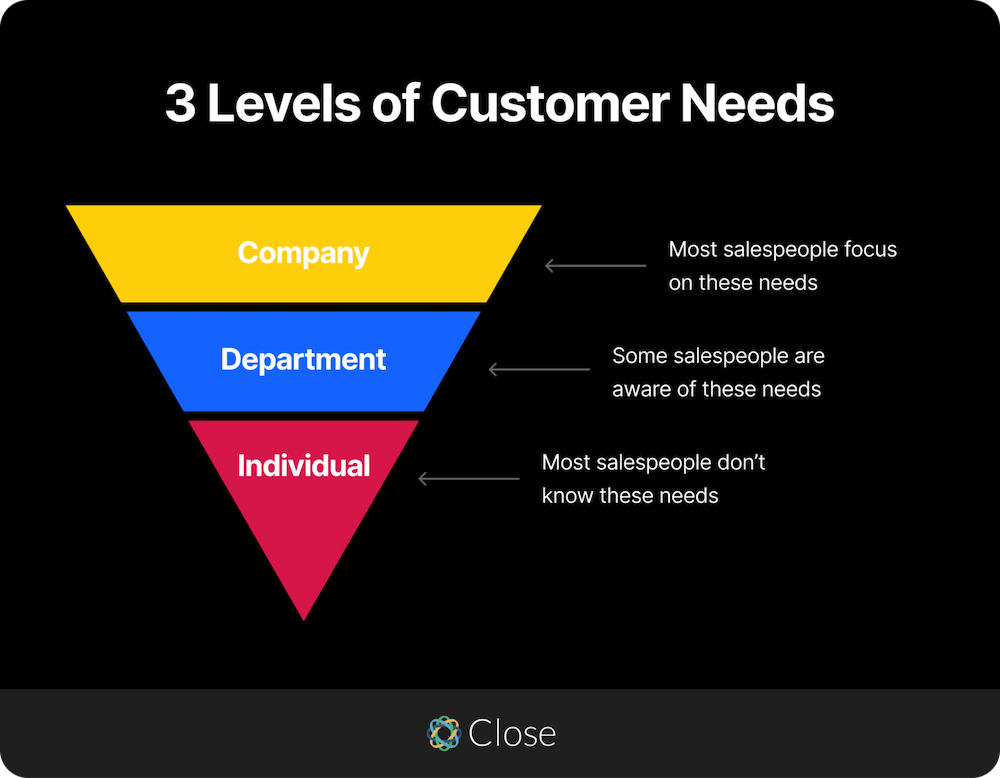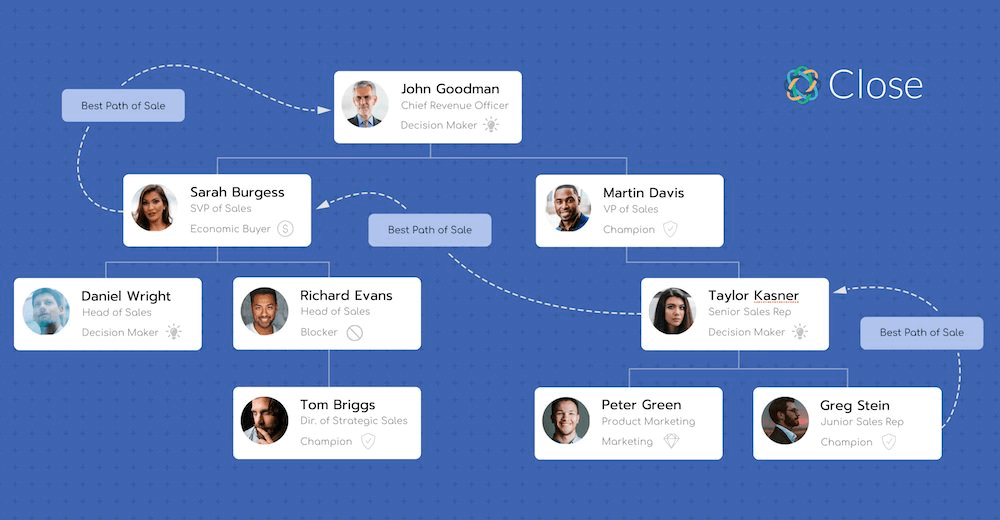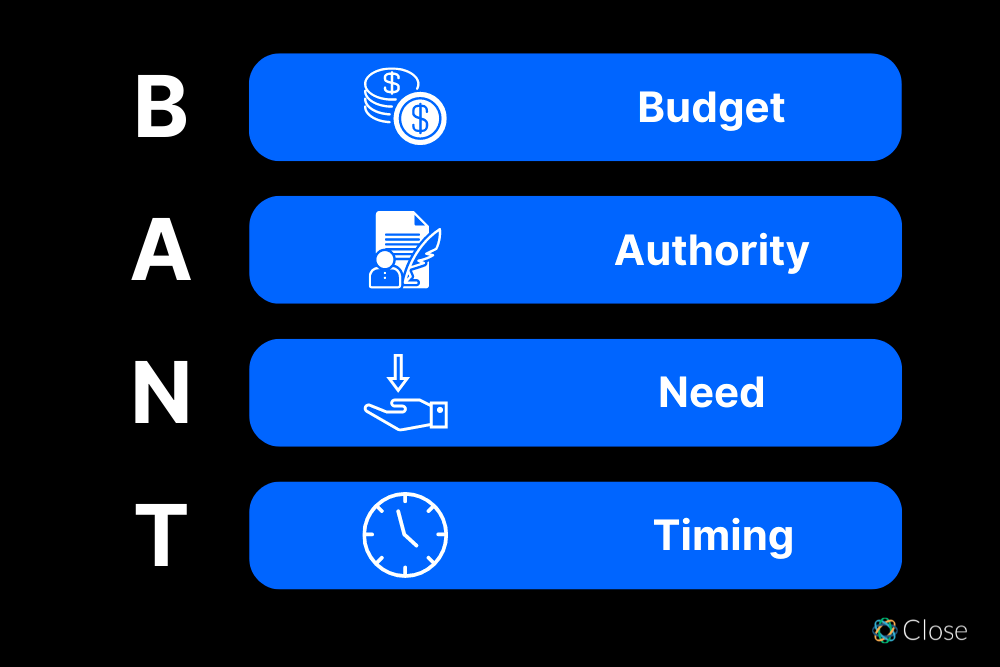
The fundamentals of qualifying prospects are simple: Can you help them? And can they help you?
But you need to better understand your prospects and what they need to sell effectively. That’s where sales qualification questions come into the picture.
They help you evaluate if a lead fits your offerings and makes for a great customer, or if they’re better off exploring other options in the market. Below I'll share qualifying questions to gather insights about your prospects. Let’s start with the basics of using thoughtful questions in your sales prospecting process.
What Are Qualifying Questions?
Qualification questions determine if someone who expressed an interest in your product or service is likely to be a good fit customer. They are generally used in both sales and marketing to identify your prospect’s needs. Generally, the answers to these questions help you compare the characteristics of a prospect against your ideal customer profile (ICP).
Sales reps can use such questions early in their lead qualification process to determine crucial details such as the prospect’s budget, business problems they are trying to solve, stakeholders involved in the buying decision, and the like.
Shh… Want to crack the code to B2B sales success? Check out our B2B Sales Funnel breakdown.
Why Are Qualifying Questions Crucial in B2B?
B2B sales has one of the longest sales cycles in the industry, with the average lead taking between one and six months to close. Asking the right questions helps your sales team filter poor fit prospects out so that they can spend more time on qualified leads. It also unveils their pain points, enabling you to customize your sales pitches.
Now that you understand their importance, in the next section, we look at some of the best sales qualifying questions you can use.
Remember, you should already know if these leads fit your ICP based on industry, size, and location, so these questions revolve around needs, decision-making, budget, competition, and closing the deal—and cover the questions you can use to qualify prospects.
1. How Did You Hear About Us?
By knowing your lead source, you can assess how well your prospects know your offering and evaluate how likely they are to convert. For instance, your historical trends may show that your leads from SEO convert better than PPC. Ask this question early and use the information to adjust your approach when explaining product benefits.
2. What Are the Top Challenges Your Team or Company Is Currently Facing?
Before you begin elaborating on your product’s features and benefits, ask your prospect about their challenges. It not only shows them you care but will let you have more targeted sales conversations later.
3. What Are Your Top Challenges?
In B2B sales, there are three levels of customer needs: the company, the department, and the individual. Guess which level is most important? Remember, you’re not selling to an organization, you’re selling to a collection of individuals. Find out what they need in their day-to-day life and prioritize solving those challenges.
 |
4. What Results Do You Want to Achieve?
Knowing a prospect’s challenges is a good start, but this question can get you deeper insights into their goals. You’ll get to know if your offering can help your prospects achieve their objectives.
You can consider an additional follow up question, “What's stopping you from reaching your desired goal by yourself?” As per Tony Uketui, a growth consultant at Closers Club, this can help you identify any major roadblocks. Later it can also enable you to “position your product or service to eliminate that roadblock.”
Seeking innovative ways to generate leads? Our guide on real estate prospecting is here to help.
5. When Would You Like to See These Results?
Your prospect may need to have their challenges resolved by a certain deadline. The closer it is, the more urgently they will look for the right solution—which could speed up the sales cycle. The answer to this question will help you close deals (hopefully faster!) and set realistic expectations about how quickly your solution can solve their problem.
6. How Would Achieving These Results Benefit You, Your Team, and the Company?
This question ties positive emotions to the resolution of their challenges and, by extension, your offering. What if your prospect wants to increase revenue because it means they could hire more employees and tap into a larger market? Their excitement about expanding is transferred to your solution when you explain how you can make it happen.
7. What Are the Consequences If You Don't Solve These Issues?
Despite a company’s or individual’s ongoing challenges, they may still be distracted by other issues. By highlighting the consequences of not solving their problems, you create a sense of urgency and keep the conversation focused on the important issues at stake.
8. What Motivated You to Search for a Solution Now?
Understanding why they’re looking right now can help you plan out the rest of the sales process. Prospects that recently experienced major changes—such as a change in leadership or a large shift in the market—may have an urgency in finding a solution, which would shorten the sales cycle.
9. If You’re Currently Not Searching for a Solution, Why Not?
A prospect may not be looking for a solution for many reasons, such as already using a competitor’s product, not having the budget, or not viewing your solution as a priority.
However, an outside perspective can motivate prospects to rethink their stance by, for instance, informing them of a better option, helping them allocate money from their budget, or uncovering the opportunity cost of not having a solution.
While prospects don’t want an aggressive salesperson, they appreciate a salesperson who educates them and challenges their thinking.
10. Which Features Are Must-Have Versus Nice-to-Have?
This question helps your prospect prioritize. You can also ask them “why” they need these features so that you know if a certain functionality is a deal-breaker, or if a workaround exists. These questions together will prevent you from pursuing deals that you could never close because even though you have everything the prospect wanted, you didn’t have everything they needed.
11. What's a Win for You in Walking Away from This Call?
Clara Johnson, a sales leader at Catalyst Software, recommends you use this question to show empathy and meet your prospect where they are.
She elaborates, “If the prospect shows up closed off or in a mood that isn't the most welcoming, make sure they know you are here to help them & you recognize this might be something they are stressed about. Ask them what they are hoping to gain from today's conversation.”
12. What Role Do You Play in the Decision-Making Process?
This is a killer sales question because it reveals if the person on the phone is an enthusiastic internal champion or a key decision-maker. You may also consider asking a similar question: “Who has the final say in the purchase decisions at your organization?”
If you’re not talking with the final buyer, be prepared to navigate through the buying process.
13. How Does Your Company or Department Make Decisions?
Knowing who makes the final call differs from knowing how a company makes decisions. For example, one person or a group may have the last word. But the company or department might consider the opinions of important stakeholders, such as the end users. You can map accounts and try to persuade these folks to improve your chances of closing deals.
 |
14. What Concerns Are These Decision-Makers Likely to Have?
Remember, you sell to individuals, not companies. Gain an edge by asking your internal champions what issues are more likely to attract or repel individual decision-makers. This can help you position your solution in the best light and prevent embarrassing or costly mistakes.
15. Which Departments Are Involved in Making a Purchase Decision?
This question is especially important when selling to large organizations. Even if the marketing department is the sole department using your solution, the procurement and legal departments may be involved in finalizing and approving the contract. Use this simple sales hack to get your contracts signed quicker and keep legal issues to a minimum.
16. Who Will Be Responsible for Implementing or Overseeing This Service or Product?
Even if the CEO loves your product, getting their approval is only the beginning of the deal. Generally, implementation is delegated to someone else. However, the person responsible for implementing your product won’t always share the CEO’s excitement, especially if it means more work with very little upside for them.
Find out who will be responsible for managing your product internally. Then sell that person on how it will benefit their company and their personal career. Otherwise, your product will be poorly implemented, and you risk churn.
17. When Do You Want to Make a Decision and Begin Implementing a Solution?
You now have a rough idea about how long the decision-making process will take, but you want to ask your prospect about a deadline in order to keep them accountable and focused on making a decision.
18. How Will You Measure the Success Of Our Solution?
Knowing how the prospect will judge the solution's effectiveness makes it easier to highlight specific features and prioritize the implementation process. Make sure to ask which metrics they want to track.
19. Who Oversees the Budget?
Earlier questions about the buying decisions should have helped you identify the person or department in question. But if you haven’t, now is a good time to ask.
20. How Much Have You Spent on Similar Solutions?
The budget for a similar product they have used in the past could determine the amount they’re willing to spend. If your price falls below their range, your solution might be too cheap. If it falls above their range, you’ll need to convince them your value outweighs the price.
21. What Is Your Current Budget?
It’s possible they've spent more in the past but now have a tighter budget, or they might have even more money available. If there’s a gap between what they spent on similar solutions and their current budget, you’ll want to know.
22. Have You Ever Gone Over an Approved Budget? If so, What Was the Budget Allocation Process Like?
If your solution costs more than the intended budget, you’ll want to know about similar cases. This will help you gauge the chances of increasing their budget and what process to expect.
23. Do You Currently Have a Contract with Another Company? If So, When Is It up for Renewal? Is There a Cancellation Fee?
If your prospect currently has a contract, your job is two-fold: convince them that their current vendor isn’t the right choice and that your solution will make their jobs and lives better.
Don’t be surprised if your prospect isn’t interested in switching in cases where they’ve recently signed or renewed their current contract. The key is to be patient and regularly follow up so that when they’re ready to switch, your company is the first one that springs to their mind. Keep them in your sales pipeline, but switch to a sales nurturing approach.
24. What Has Worked and Hasn’t Worked with Your Current Solution?
Picking up on unmet needs is a great way to position your product as a better solution if your product can solve those issues. Start by offering small solutions now–such as a template or webinar–and use the time to better understand how you can help.
25. Why Did You Choose That Particular Solution?
When you're qualifying prospects, you mostly ask questions that focus on the present, but asking questions about the past can give you information about what they liked (or disliked) about past buying experiences. If they were positive, associate your solution with that success and use it as a model for how you sell.
However, if their last buying experience was a flop, distance yourself from it and frame your solution as something completely different.
- How is your offer better?
- How does it protect them from missteps like these?
- Why won't they have to worry about making another bad choice if they choose you?
26. How Does Our Solution Compare to Competitors You've Considered?
Prospects are savvier than ever. At the very least, you need to know how prospects perceive your competitors’ strengths and weaknesses so you can sell against the incumbent in your market. However, if you really want to blow the competition away, outcompete your competitors by pitching their product.
27. Are You Considering Building Your Own Solution?
Don't overlook the potential competitor right under your nose: your prospect. Especially if they're developers, they might think they're better off building their own solution.
While that option provides more control, it might not be the most time-efficient option, particularly if they must maintain and update it regularly. You can even share (if possible) case studies or relevant examples of customers who initially invested in building their own solution and found that it’s not feasible in the long term.
28. What Steps Will Help Make This Deal Happen?
This is called the virtual close, and it’s one of the most powerful questions you can ask. You get to learn what it would take to turn the prospect into a customer, get a roadmap to the prospect’s buying approach, and uncover any major red flags you can address.
28. Are There Any Obstacles That Could Prevent This Deal from Happening?
This question prompts your prospect to identify potential roadblocks, so you can be proactive instead of reactive. In this part of the sales process, reducing the timeframe to close is crucial.
30. Based on What We’ve Discussed, Do You Think Our Solution Is a Good Fit for Your Needs? Why or Why Not?
At this point, you should know whether the prospect is qualified, understand the decision-making process, and be prepared for potential obstacles. This helps you handle objections that haven’t been addressed, and re-confirm the prospect’s interest in your product.
31. We Still Need to Cover [X and Y]. Can We Meet With [Stakeholder] Next Week? Does Wednesday Work?
The best time to schedule a follow-up conversation is when your prospect is still on the phone! While you’re still talking, ask them to look at their calendar and schedule a time that works for them. Then, make sure you send them an email a day or two before the next meeting, to confirm your next appointment.
5-Point Checklist for Sales Lead Qualification
You don’t need to ask every single question from our list above (or maybe none at all for a specific prospect).
But how do you qualify, then? While I’ve covered lead qualification in more detail, in short, you can rely on frameworks, such as BANT, ANUM, MEDDIC, CHAMP, etc.
 |
Rooted in these frameworks, here are five relevant data points you need to know by asking some of the questions above.
- Need: What do they need?
- Authority: Who are the decision-makers, and how do they make purchases?
- Budget: Can they afford your product or service in the first place?
- Roadblocks: What other solutions are they considering? Are there any other obstacles that can prevent the deal from happening?
- Urgency: Are they ready to take the next step, such as having another meeting, attending a product demo, signing up for a trial, etc.?
From there, you’ll know if you can help them, and if they can help you.
Hey you! Yes, you. Interested in lead qualification? Our article on MQL vs. SQL is essential.
Integrate Relevant Questions in Your Sales Qualification Process
Qualifying questions can give you a deeper understanding of your prospects and their fit for your company, but you can’t blast discovery questions one after another simply to push the prospect forward in your sales funnel. You need to be authentic. Be genuinely curious and actively listen to your prospects. Sales scripts are there to keep your messaging focused, but you can get creative.
Sales leader, Clara, recommends you mirror the energy of your prospects. “This takes skill and EQ, but once you intentionally practice this, you'll get the hang of it! Try to match their tone of voice, the energy they bring to the call, and overall body language.”
She continues, “If the prospect shows up energized and chatting, meet them there! Perk up, ask more discovery questions (even if that means not getting to pitch your product), and see if you can connect on a few things non-work related.”
You can then use this information to inform your outreach, tailor your sales presentation, or uncover decision-makers. Remember to add this information to your CRM so everyone on your team can access prospect insights.
Did you know you can automate email follow-ups with Close’s email workflows? Watch the demo or try it out for free for 14 days.










